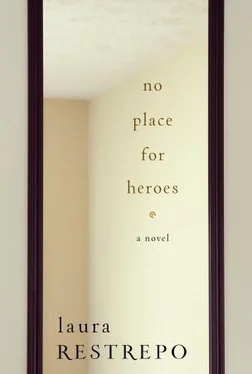“What I want to tell you about is that Andrea thought that her father’s accident had been in the Citroën, and that a few days afterward had been very surprised when she saw the Citroën in perfect condition, not even a scratch on it. How was it possible that her father had died in the Citroën, and not a thing had happened to the car? But she didn’t ask. Not at all. She said she didn’t ask anything, didn’t think anything, didn’t come to any conclusions. Only later would she find out that he had been gunned down, and that the Citroën had nothing to do with it.
“Now Andrea knows exactly how everything happened and has filed a legal case against the murderers and she has to testify and give statements. But as a girl she knew nothing. She says that the death of her father seemed unreal because she was only eight when they killed him. She didn’t understand what it meant to die, no one near her had ever died, and on top of that, during the funeral the coffin was closed and she never even suspected that he was in there.
“Andrea told me that she had loved him very much, and that her father had loved her in the same way. I asked her how she knew this, that is, how she was so sure that el negro Robles had loved her, and she said that he always brought her little presents, postcards and maps of the world. And some castanets. Andrea still had those castanets that el negro Robles had brought her once, surely from Spain. But she also knew that he loved her because when she was born, her father ran out and bought all the books by Piaget to understand what children were like and how to best educate them. Tell me, Lolé, did Ramón read all the books by Piaget after I was born, because if he did, they didn’t do him much good.
“One day, Andrea had invited her father to a cafeteria to have a coffee. She told me that she was very small and that she had never in her life had a coffee because it probably tasted terrible, but because she saw el negro talking in cafés with his friends and they all drank coffee, she had wanted to do the same, and she tore into a long monologue on why he had to return to live with her mother.
“In any case, after they killed her father, Andrea Robles began to miss him like never before, that’s what she told me. So she started to pretend that he wasn’t dead but was traveling in Europe and that he would bring her back postcards and castanets. She also liked to imagine that he had lost his memory, a blow to the head or something like that, and since he didn’t remember anything, he couldn’t look for her or call her. It was funny when Andrea told me that, Lolé, because once I also relied on that story that Ramón had lost his memory. I asked Andrea Robles if she ever imagined that her father had been imprisoned, and now it was her turn to laugh, probably because she had thought up that excuse as well.
“Andrea Robles continued to make up stories for herself until one day she picked up the newspaper and saw a picture of her father riddled with bullets. It was on the anniversary of his death, or something like that. Andrea said that it had been a horrible blow, although she was already eighteen, a horrible blow to see the picture of your own father’s body riddled with bullets. Imagine that, Lolé, it must have been quite the surprise. Of course it helped her, what I mean is that, in the end, finding that picture was a good thing for Andrea Robles, because it forced her to finally accept the fact that el negro Robles had died. And she also realized that he had been a brave man and that he had died fighting against injustices and for the poor, and she became such a fan of her father that now she wants to emulate him in everything. But what about that photo? He was bullet-ridden, Lolé, how fucking crazy, to all of a sudden come upon a picture of your own father riddled with bullets. Did I tell her I was named César in honor of her father? No, but I think she already knew.”

ONE DAY AT noontime, Lorenza had agreed to meet Forcás at a place called Banchero, on the way to Primera Junta. They had set aside barely an hour to be together and he had invited her to that pizzeria, where she had never been, because they made a top-notch fugazza that she had to try. But she was late, she had gotten the streets wrong and in haste had walked past the place and had to turn back, convinced that she would not arrive on time. Forcás would get up and go as it had to be. The ten-minute waiting period had just about come and gone when she saw him, at an instant when and in a place where she had not expected to see him. But it was him, it was Forcás; there he was seated at a table, in a white shirt, at a restaurant that had not been the one they agreed upon. Aurelia looked up and saw the name of the spot; it said Banchero. Then it must be the place, Banchero, she thought, look no further. Just a little while before she had passed right in front of it and kept on going.
He looked very handsome in his white shirt, but he was in a bad mood, maybe due to her lateness, or because he had asked for two very cold Quime beers and by the time she got there they weren’t that cold anymore; and besides, Aurelia told him that she would rather have a Pepsi because she didn’t drink beer and to make things worse, she didn’t want the fugazza that he had wanted her to taste and instead ordered a small pizza à la calabresa , who knows why. So the truth was that their encounter had not been going as well as their previous ones. There was in fact a noted unpleasantness as their allotted hour slowly wound down, and so she did her best to try and fix things. But Forcás wasn’t saying much and he couldn’t take his eyes from a television screen in the corner, which the owners had put there so that the clientele could watch the World Cup, which that year was played in Argentina.
The local team consisted of players of the caliber of Kempes, Passarella, Fillol, and Ardiles, and the whole country was celebrating their goals with wild street parties. But the dictators were also celebrating ostentatiously, congratulating themselves, that was the fucking thing, coming out on their balconies to greet the crowds after each game, proud as peacocks, paternal and populist, as if the victories on the soccer field were something owed to their government. With the World Cup, the military junta was scoring its greatest goal: thanks to fútbol , it washed its face in an Olympic gesture and showed itself to the world recently shaved, spotless, free of dirt and straw, and cleansed of blood. If there were international doubts or causes for concern about what was happening in Argentina, now everyone could relax before the spectacle of a euphoric populace out in the streets celebrating the victories of the phenomenal team, side by side with the military. The generals had managed to get in their pockets a specific type of local, who boiled over with patriotic fervor, and some foreign correspondents, who praised the friendly climate and the feeling of good sportsmanship that reigned in the country. The collective enthusiasm even gave the impression that on that very day, at that very hour and moment, the dictatorship was reaching its zenith, its summit, its consecration, and its historic justification.
“These sons of bitches want to cover up the dead with goals,” Forcás cursed in a low voice, and sucked furiously on his Particulares. “They’ve made even fútbol into a bitter topic.” As part of its face-cleaning, the regime had decided to attack the deep-seated Argentinean tradition of throwing confetti on the field during games. With the argument that it was low class and damaged the image of the country, the regime had mounted a systematic campaign to intimidate the crowds and stop them from throwing the confetti. But every day Clemente, an irreverent and demented bird who was the central character in a comic strip, incited disobedience from the pages of Clarín , poking out from the frame of his little story to throw confetti on the reader. And it so happened that Forcás had not finished his fugazza nor Aurelia her calabresa when they saw on the television what looked like a torrential downpour of tens of millions of little pieces of white paper that began to fall over the field, slow and uncontrollable, inundating the stadium and bursting forth on the screen. Big win by Clemente, they had wanted to scream if they could have. The people had dared to throw confetti, to openly defy the regime, however innocently and spontaneously — more festive than anything, in truth, not a big deal. But during those days of panic and subjugation, maybe that had been a sign, a minute and somewhat imperceptible initial indication that upon reaching its highest point, the pendulum had begun to swing back. Or at least that’s what both of them must have intuited, because in that fantastic confetti cloud they enthusiastically embraced, as if wanting to celebrate something.
Читать дальше













